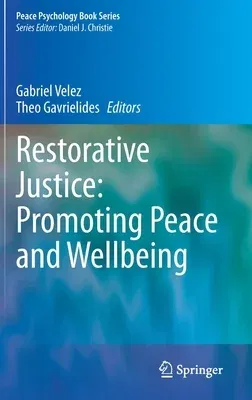Restorative Justice: Promoting Peace and Wellbeing (2022)Hardcover - 2022, 27 September 2022

Qty
1
Turbo
Ships in 2 - 3 days
In Stock
Free Delivery
Cash on Delivery
15 Days
Free Returns
Secure Checkout

Part of Series
Peace Psychology Book
Print Length
224 pages
Language
English
Publisher
Springer
Date Published
27 Sep 2022
ISBN-10
3031131002
ISBN-13
9783031131004
Description
Product Details
Book Edition:
2022
Book Format:
Hardcover
Country of Origin:
NL
Date Published:
27 September 2022
Dimensions:
23.39 x
15.6 x
1.6 cm
ISBN-10:
3031131002
ISBN-13:
9783031131004
Language:
English
Location:
Cham
Pages:
224
Publisher:
Series:
Weight:
539.77 gm